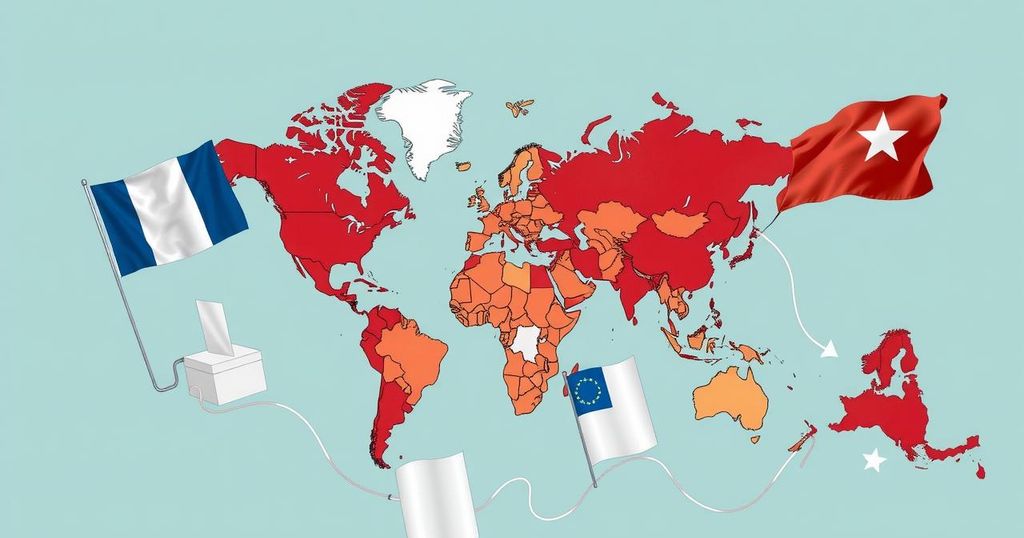2024: A Year of Democratic Turbulence and Voter Discontent

In 2024, global elections revealed overwhelming voter dissatisfaction, resulting in significant turnovers of incumbent governments across multiple nations. Economic instability and social unrest fueled these shifts, with allegations of electoral fraud and foreign interference complicating the political landscape. As countries continue to grapple with these challenges, the future of democracy appears precarious, marked by heightened voter activism and unpredictability.
In 2024, global elections reflected widespread voter dissatisfaction, leading to significant changes in numerous countries. Approximately 70 nations, representing half of the world’s population, conducted elections, and incumbent governments faced considerable backlash. From India to the United States, economic turmoil and global instability drove voters to reject established leaders in favor of new political actors, sometimes of an extreme nature. The year also witnessed intensified social unrest and allegations of electoral fraud in various regions, culminating in a tumultuous political landscape marked by both rising authoritarianism and voter activism.
Toppling established parties became a recurring theme, particularly in nations burdened by high inflation, unemployment, and social inequalities. Notably, South Africa’s long-dominant African National Congress lost ground significantly in May, demonstrating the electorate’s shift in favor of coalition politics. Similar trends were observed in Senegal, Ghana, and Botswana, where voters actively sought change after decades of uninterrupted governance.
In the world’s largest democracy, India, Prime Minister Narendra Modi’s party lost its parliamentary majority for the first time in a decade, necessitating coalition governance. Japan also experienced a seismic shift as voter outrage over corruption scandals undermined the longtime ruling Liberal Democratic Party. The United Kingdom and European Union saw similar patterns, with a surge in support for far-right movements amid growing voter fragmentation.
The trend of voter discontent was compounded by external factors, with allegations of foreign interference becoming increasingly prominent. Social media campaigns, particularly those attributed to Russian influence, were reported in multiple countries. Such interference raised concerns about the integrity of electoral processes and democratic governance.
As the year concluded, the political climate remained fraught with challenges, especially following Donald Trump’s unexpected presidential victory in the United States, sending ripples of uncertainty globally. Countries like Venezuela and Mozambique grappled with severe political crises, further exemplifying the tumultuous nature of global democracy in 2024.
The future of democratic systems looks uncertain as incumbents face heated challenges, with upcoming elections scheduled in Canada and Germany amidst ongoing discontent with current leadership. This ongoing environment of instability emphasizes the importance of addressing voter expectations and the need for responsive governance.
The article discusses the outcomes and implications of widespread elections around the world, particularly in 2024, characterized by significant anti-incumbent sentiments. It highlights a global trend towards shifting political allegiances in response to economic difficulties, increased social unrest, and challenges to traditional governance structures. This examination is informed by the context of post-pandemic recovery struggles, authoritarian tendencies, and allegations of foreign interference in democratic processes. It reflects the evolving challenges and dynamics of global democracy at the close of 2024.
In summarizing the events of 2024, the article illustrates a year marked by widespread discontent towards incumbents leading to significant electoral upheaval across the globe. The prevailing issues of economic distress and political dissatisfaction have prompted voters to seek alternative leaders, resulting in a landscape increasingly characterized by instability and fragmentation. With looming elections on the horizon, the trajectory of global democracy remains uncertain, underscoring the critical need for responsive governance that meets public expectations.
Original Source: www.clickondetroit.com







